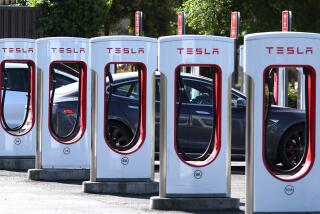Panel recommends federal gas tax increase
- Share via
WASHINGTON — As Washington struggles to find ways to fund highway improvements, a congressionally created commission on Thursday called for a 10-cent-a-gallon increase in the federal gas tax, while proposing that the country move to a system of charging motorists for how much they drive.
The idea of a tax increase would probably face strong resistance from lawmakers seeking reelection and consumers already reeling in a tough economy. And the Obama administration last week gave a cold shoulder to any mileage-based tax -- which would require placing tracking devices in taxpayers’ vehicles, a concept critics decry as an invasion of privacy.
Still, the recommendation will be part of an important debate as Congress prepares to write a massive highway bill: how to pay for maintenance and traffic-easing road construction when the current 18.4-cent-per-gallon federal gas tax no longer provides sufficient funding.
Last year, Congress approved an emergency $8-billion bailout of the highway trust fund because gas tax receipts were failing to keep up with spending.
On Thursday, the National Surface Transportation Infrastructure Financing Commission called for the 10-cent-per-gallon increase, as well as indexing the federal gas tax to inflation. The panel also backed adoption of a system to begin charging motorists by 2020 based on how many miles they drive.
Relying on a gasoline tax is “not sustainable in the long term and is likely to erode more quickly than previously thought due in large measure to heightened concerns regarding global climate change and dependence on foreign energy sources, which are creating a drive for greater fuel efficiency, alternative fuels and new vehicle technology,” the commission report said.
The 15-member bipartisan commission said that charging motorists based on how many miles they drive “embodies the ‘user pays’ principle and more accurately aligns the costs and benefits of the surface transportation system to those who are using it.”
The recently approved economic stimulus bill provides billions of dollars for infrastructure spending, and the commission report said that would be helpful. But, it added, “A stimulus package that includes nearly $40 billion for highway and transit infrastructure, while important in addressing the short-term economic crisis, will pay for only about three months of the identified annual national funding gap to maintain and improve the system.”
The idea of charging motorists based on how far they drive was already provoking debate.
“We must be mindful that American families are already struggling during this economic crisis,” Sen. James M. Inhofe of Oklahoma, the top Republican on the Senate Environment and Public Works Committee, said Thursday. “The last thing we need to do is place a large tax increase on them at the pump.”
--
More to Read
Sign up for Essential California
The most important California stories and recommendations in your inbox every morning.
You may occasionally receive promotional content from the Los Angeles Times.











